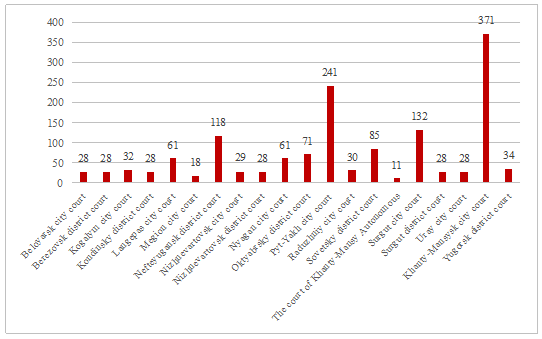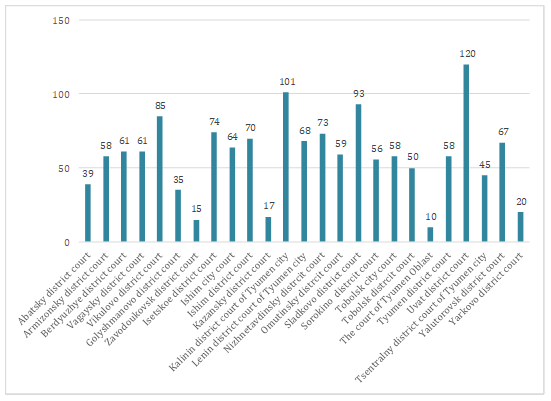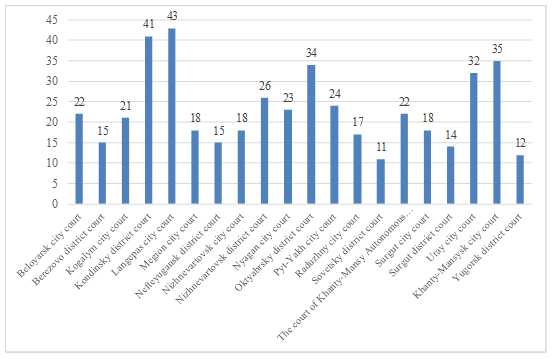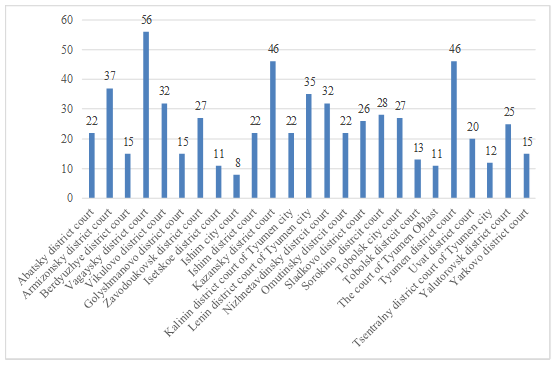Abstract
The article deals with the comparative analysis of Internet technologies - the websites of law courts of the Federal Republic of Germany and the Russian Federation. The Russian Federation is presented by the websites of 20 law courts of Khanty-Mansiysk Autonomous region of the Russian Federation and the websites of 24 law courts of the Tyumen region. The purpose of the study is to detect quality, openness and availability of these technologies for the population as one of the criteria to ensure wellbeing of society. The emphasis is placed on the research of those courts’ websites, which are located in remote regions of the specified states. The article presents various graphical data in the form of charts; quantity characteristics of judicial websites content: address and contact information of courts; information for visitors, including their rights, obligations and prohibitions; samples of procedural documents for participants of legal proceedings; courts’ staff; data on the regulatory legal acts, etc. The conclusions are made after the detailed research of the given issues concerning both stated in general and separately.
Keywords: CourtInternet technologywell-being of societyopenness and accessibility of courtsE-justice
Introduction
Internet technologies are an integral part of society now and are the main tool to acquire knowledge about any phenomenon, action or fact. Wellbeing of society in many respects depends on free access to the information on the Internet, especially if we speak about public authorities activities. Besides, wellbeing of society depends also on qualitative and effective implementation and provision of citizens’ rights.
It is important to know that the right to be informed is one of the constitutional principles, and it is enshrined in many constitutions of various states. For example, part 4 of Article 29 of the Constitution of the Russian Federation says: "Everyone has the right to freely search, receive, transfer, produce and distribute information by any legal method". And part 2 of Article 24 of the Constitution of the Russian Federation specifies that "Public authorities and local government bodies, their officials are obliged to provide everyone with access to the documents and materials which directly affect their rights and freedoms if other things are not provided by the law" (Collection of the legislation of the Russian Federation, 1993).
Therefore, these constitutional requirements shall be fully observed in case of interaction of state, including judicial, bodies with society through the Internet. Moreover, a number of legal acts, which obliged judicial authorities to place information about their activities on the Internet, have recently appeared.
The federal law "About Ensuring Access to Information about Courts Activity in the Russian Federation" provides openness and availability of information about courts activity, freedom of search, obtaining, transfer and distribution of information about courts activity by any legal method. According to the Article 6 of the Federal Law one of the methods providing citizens’ access to information about courts activity is placement of information about courts activity on the Internet. Relevant requirements can be found also in Article 6 of the European Convention on human rights and fundamental freedoms protection.
Problem statement
The main problem is to determine how judicial authorities interact with society through the Internet, and how open and available this interaction is to society. The second important problem is the quality of law courts’ websites. Do they place complete information on the Internet pages?
Research issues
There are no doubts that modern Internet technologies allow us "to erase" borders between the population and judicial bodies, having increased thereby transparency of justice and, as a result, efficiency of its work in the opinion of community. The main thing is that any person should have an opportunity and ability to use appropriate technologies. What is more, the law courts’ websites are ready to give a lot of information about judicial authorities’ activities and cases considered in court. Therefore, it is interesting to pay attention to the situation with Internet technologies in the western countries and compare them to the Russian Internet technologies. What information are the websites of their law courts ready to provide for citizens?
The purpose of the study
It is necessary to compare the websites of law courts of the Russian Federation and the Federal Republic of Germany as this state with its Roman-German system of law is closer to the Russian one. Moreover, much of what Russia has in its procedural legislation nowadays was borrowed from Germany.
Methods and Results
In Germany, Local courts and District courts are considered to be law courts of the first instance. They are structurally and meaningfully closer to Russian district courts of general jurisdiction. It will be more interesting to compare their websites content to Russian courts’ websites. For the research, we have chosen the court website of Osnabruck in the region of Lower Saxony (Niedersachsen) of the Federal Republic of Germany (Amtsgericht Osnabrüc, 2016), the court website of Magdeburg (Amtsgericht Magdeburg, 2016) and the district court website of Offenbach am Main (Amtsgericht Offenbach, 2016). The Russian Federation is presented by the websites of 20 law courts of Khanty-Mansiysk Autonomous region of the Russian Federation and the websites of 24 law courts of the Tyumen region.
The carried-out comparison of the websites of law courts of the two countries allowed receiving the following interesting results.
1. The German courts websites contain all necessary contact information including the postal address of a court, its phone number and fax. Citizens are given the opportunity to send any message to court by e-mail. However, the court website of the city of Osnabruck contains a fair clause that e-mail isn't intended for sending confidential or legal documents. It is remarkable that the similar rule does not allow Russian courts to receive claims or other statements by e-mail. However, now they are developing the procedure on receiving and handlings documents in an electronic (digital) form.
The similar information about the court name, the judicial area of the court, its postal address, the e-mail address (if there is), the phone number which can provide reference information is provided on all law courts websites of Khanty-Mansiysk Autonomous region-Ugra and the Tyumen region. And some websites contain electronic maps specifying a court house location in this or that settlement, which, undoubtedly, is convenient for those citizens who face justice for the first time. It should be noted that the similar detailed information about the court location began to be placed everywhere with the use of unified Internet content of courts of law, connected to the state automated system "Justice". In 2009 such information was not complete. According to the earlier research conducted by the author, only 94.2% of law courts (as a rule, regional courts) had complete information about the court address and its phone number.
2. The court website of Osnabruck specifies reception hours of citizens: Monday, Tuesday, Wednesday and Friday, from 8:30 till 12:30, and Thursday, from 12:00 till 16:00. If we compare it with Langepas city court of Khanty-Mansiysk Autonomous region, we will find the following time: Monday to Thursday, from 8:30 till 12:30 and from 14:00 till 17:30, Friday from 8:30 till 14:30 (Langepas City Court, 2016). The only difference is that Russian courts are open and available to citizens for longer time, than in Osnabruck. Both Russian and German websites specify how citizens can get to the court due to the reference "how to find us".
3. It is remarkable the court website of Osnabruck has the rules of visiting the court house. In particular, people are not allowed to carry weapons of any kind (including thrust weapons, also pocket knives, peppery spray), fluffy containers and containers made from glass or porcelain, whistles, sirens and similar objects, narcotic substances, and also other objects. There is a stipulation about smoking prohibition in the court house and presence of pets in the courtroom, except guide dogs. Russian law courts websites also prohibit bringing any kind of weapon, including ammunition, chemical, poisonous substances and explosives. Moreover, the Russian list is bigger and forbids to enter a court house:
- visitors with bulky objects (bags, suitcases, rollups, etc.) without survey;
- visitors with the film and photo equipment without coordination;
- children up to 14 years without close relatives, trustees or teachers guidance, (or other accompanying persons);
- incapacitated persons without trustees or legal representatives;
- persons performing trade, and those who are engaged in ticket distribution and advertizing;
- persons with dogs (except convoy dogs and guide dogs, dogs shall be in muzzles) and other animals, reptiles and birds;
- persons with signs of alcoholic, psychotropic, drug intoxication or behaving inadequately and aggressively;
- with the appearance not relevant to sanitary and hygienic, ethical and ethical standards, and rules (The rules of access control and behavior of people in buildings (premises), district (city) courts of Khanty-Mansiysk Autonomous region –Ugra, 2016).
Apparently, courts of Germany are more democratic and liberal to visitors as they do not set a large number of restrictions and prohibitions for visitors. But, at the same time, similar "hyper openness" of German courts can help criminals and terrorists, especially in connection with the latest events occurring in Europe.
4. It is also necessary to say what kind of information court websites provide about persons with limited opportunities (disabled people). According to the information of the Russian courts websites disabled people are not provided with any separate privileges, except for only the admission in the building bypassing the stationary metal detector. If we read the information on the website of Local and District courts of Germany, we will know that persons with limited abilities are provided with:
• two public parking places (in Russia they are provided with the same parking places, but, unfortunately, they are always occupied by cars whose drivers are nor disabled people), and also an adjacent garage for 12 places (!) for disabled people to park;
• mobile available ramps, buttons to call the court staff (the given rule is taking root everywhere in Russia the last 3-6 years);
• special elevators for disabled people, including elevators to get to the building from the street. All floors in the courthouse are also specially designed for blind people. There are toilets and other sanitary and hygienic equipment for disabled people on each floor. Alas, for most Russian courts, whose buildings were built during an era of the USSR, these technologies still remain inaccessible because of high cost and specifics of buildings structure, especially those which are located in rural areas or in small cities in the province.
5. As for staffing, websites of German courts contain only short information with reference to websites of superior courts and recruitment agencies where it is possible to obtain all information about employment in courts, including preliminary training and retraining. Websites of the Russian courts, on the contrary, contain all information about staffing, including information on the requirements to candidates for judges posts, information about how to become a public service employee, information about the conditions of how to get vacancies, information about vacant positions in the office of court.
6. There are sample forms of various procedural documents available on websites of law courts. This will simplify interaction of citizens with judicial authorities as it will help people who do not have due legal knowledge and skills correctly bring up a statement or a claim. Thus, the court website of Osnabruck contains document forms in the PDF format some of which are available to fill right away. There are 63 forms altogether, but they are not forms of actions for declaration or claims, they are mainly requests, questionnaires and booklets for various language national groups: there are forms in German, Arab, French, Turkish, English, Pashtu, Albanian and in Farsi. Therefore, to receive information on how to make a claim or bring up a complaint action, citizens can use links to Bars and notaries who will help them with this.
In the Russian Federation, all websites of law courts have a special tab where various samples of procedural documents (in HTML format, in Russian), including actions for declaration, claims, petitions and other statements. Their number varies on average from 20 to 60. There are also websites of courts where their number is between 100 and 200. Thus, the website of the Khanty-Mansiysk district court of Khanty-Mansiysk Autonomous district contains 371 samples of documents (Figure


Nevertheless, German court sites are more specific than Russian court sites because they provide a detailed guide on legal cases (disputes) about what kind of disputes can be considered in court, what their specifics and difficulties are, including evidence presentation and payment of expenses by participants of legal proceedings.
1. In our opinion, it is essential that regulatory legal acts of federal and regional levels regulating legal proceedings should be placed on court sites. What is more, people should be informed on what legal rules regulate court activities and to what extent their actions are legal. For example, the court website of Osnabruck has a link to the official site of the government of Lower Saxony (Gesetze, Verordnungen und sonstige Vorschriften. Portal Niedersachsen, 2016) where various laws, rules and requirements are placed including activity of general jurisdiction courts. If we compare them with the Russian court websites, we will see that the latter have a special tab "Legal basis" where one can find various regulatory legal acts, including bylaws regulating court judicial activities. And the number of regulations varies on average from 12 to 32 on the court websites in Khanty-Mansiysk Autonomous region-Ugra (Figure


8. It is more important for people to receive information on their case advancement in court, including judgments. For this purpose, the websites of German city and district courts have the European electronic justice portal, which provides citizens of the European Union with detailed and useful information about legal proceedings. And, as far as judgments are concerned, Internet users are provided with the ECLI search engine regarding all cases which have been considered in courts of the European Union countries for the last 15 years. However, this system gives information about cases from only four states - Spain, Netherlands, the Czech Republic and Slovenia. In this connection, it is difficult to get access to court decisions of other European Union countries (European e-Justice Portal, 2016).
There is no similar problem in the Russian Federation, as, according to the legislation, each judicial authority must post on the website information on case advancement, including information about cases to be heard and judicial decisions. Any Internet user can, without leaving home, have a look at the list of the cases appointed to hearing for this or that judge; knowing the case number, one can trace its advancement and at what stage it is. Using the detailed search engine which provides case types, a judge’s or claimant’s surname, one can find the necessary judicial decision, either a sentence, or an act, read and print it. This has became possible nowadays due to the implemented state automated system "Justice" and its subsystem "Bank of judgments". This subsystem considerably facilitates legal proceedings and helps physically disadvantaged participants of cases or those who live in other places to read judicial decisions without leaving their home. Judicial decisions normally contain detailed information about a case plot (except for personal data, address, etc.) which allows to understand and the causes of the dispute or the committed crime (offense). This circumstance will be useful for specialists in jurisprudence, scholars, including students, undergraduates and graduate students.
Results and conclusion
1. In the Russian Federation, there is a federal law "About ensuring access to information about activities of general jurisdiction courts of the Russian Federation", federal target programs "Development of Judicial System for the period of 2002-2006" and "Development of Judicial System for the period of 2007-2013". Due to these programs and the law, the system of Russian justice has become much more open, transparent and available for people during the last 5-7 years.
2. The websites of law courts being unified and connected with the state automated system "Justice" follow completely the requirements of articles 12-15 of the Russian Federal law "About ensuring access to information about activities of general jurisdiction courts of the Russian Federation", including availability of the information which was not provided by the Law (additional information about judges, their photos, information on anti-corruption, etc.).
3. It is reasonable to place samples of procedural and other documents on court websites because it is useful for people and convenient for judges when considering cases. It is pleasant that there are websites of law courts where we can find over 120-200 samples of procedural and other documents "for all occasions". Such large number of samples is very helpful for people: the quality of completed claims and statements will increase, the number of mistakes in registration forms and relevant documents will decrease, the trial process will be more efficient as judges having templates will have less time case hearing (be it civil or criminal). As a result, judicial decisions will be more efficient and correct.
4. Implementation of new Internet technologies will allow many citizens (especially those living in remote areas or who for health reasons are not capable to go to court) to obtain all necessary information about their cases and read judicial decisions without leaving home. There is no doubt that in future most people will be able to take part in judicial sessions using online systems of video conferencing.
As for German court websites, there are the following interesting facts.
1. Each court website in Germany has its own interface and content style. In some cases they are similar, and in other cases they are not. The technological drawback is that it is more difficult for visitors of websites and participants of legal proceedings. In the Russian Federation due to the state automated system "Justice" all websites of law courts are unified, i.e. have the same interface and identical contents of Internet pages, which is clear for users. 7-10 years ago each court in Russia also had a website with its own design and interface with different information. It was not according to he Federal law "About ensuring access to information about activities of general jurisdiction courts of the Russian Federation" adopted in 2008. Now the situation is completely different.
2. Court websites in Germany do not contain detailed information about reviews of court activity, there is no information about particular cases or trials. Unlike court websites in Germany, Russian courts place most part of reviews of court activity. That is why some court websites archives of reviews, both on civil and criminal cases. A number of courts also post information about legal statistics, which is not unimportant for researches in the sphere of judicial activities.
3. Court websites in Germany do not contain detailed information for citizens and participants of legal proceedings, especially procedural information. There is only general information, including "The guide on legal cases" and information for visitors. Russian court websites contain the most detailed reference information useful for participants of legal proceedings and other people. The information is about bank details and payment procedure of the state fee, penalty, pledge; the procedure of judgment appeals (both intermediate and final) concerning civil and criminal cases; the procedure of considering citizens’ pleads of not procedural nature and personal meetings; the rules of acquaintance with materials of civil and criminal cases, etc. (Vikulovsky District Court of Tyumen region, 2016).
Nevertheless, Russian court websites have a number of drawbacks which should be mentioned.
1. The subsystem "Bank of judgments", being quite specific, is not always timely renewed and filled with new judicial decisions, especially if it concerns the latest completed trials. It is connected with the fact that it is necessary to take out the information concerning personal data, bank, commercial or state secrets. What is more, this subsystem glitches and works unstably more often than other subsystems.
2. Unlike German court websites, Russian websites have no detailed brochures or information pages which could explained to inexperienced visitors the rules who to use court websites. It especially concerns the Judicial Clerical Work tab which shows case advancement in court.
Thus, both courts of the Federal Republic of Germany and courts of the Russian Federation, despite some incompleteness of informational content, are a striking example of the idea that courts should be open, reliable and available to society. This fact is one of the important conditions of ensuring wellbeing not only in this or that country, but also in the whole mankind.
References
- Amtsgericht Osnabrück. Retrieved from http://www.amtsgericht-osnabrueck.niedersachsen.de
- Amtsgericht Magdeburg: Amtsgericht. Retrieved from http://www.ag-md.sachsen-anhalt.de/amtsgericht.
- Amtsgericht Offenbach - Startseite. Retrieved from https://www.ag-offenbach-justiz.hessen.de.
- Collection of the legislation of the Russian Federation. (1993). Constitution of the Russian Federation (adopted by popular vote 12/12/1993) // Collection of the legislation of the Russian Federation, 04.08.2014, №31, Art. 4398.
- Convention for the Protection of Human Rights and Fundamental Freedoms (conclude in Rome 04.11.1950) Collection of the legislation of the Russian Federation. 08.01.2001. Number 2. Art. 163.
- Federal Law of 22.12.2008 №262-FZ (ed. From 23.06.2016) "On providing access to information about the activity of the courts in the Russian Federation" Collection of the legislation of the Russian Federation, 29.12.2008, 52 (h. 1), Article. 6217.
- Gesetze, Verordnungen und sonstige Vorschriften. Portal Niedersachsen. Retrieved from http://www.niedersachsen.de.
- European e-Justice Portal. Retrieved from https://www.e-justice.europa.eu.
- Langepas City Court. (2016). Official cite of the Langepas City Court of the Khanty-Mansiysk Autonomous Okrug-Ugra Retrieved from http://langepas.hmao.sudrf.ru/
- The rules of access control and the behavior of people in buildings (premises), district (city) courts of the Khanty-Mansiysk Autonomous region-Ugra dated 01.02.2016 №53-O // Official site of the City Court of Surgut, Khanty-Mansiysk Autonomous region-Ugra. Retrieved from http://surggor.hmao.sudrf.ru/
- Vikulovsky District Court of Tyumen region. (2016). Official site of Vikulovo District Court of Tyumen region. Retrieved from http://vikulovsky.tum.sudrf.ru/
Copyright information

This work is licensed under a Creative Commons Attribution-NonCommercial-NoDerivatives 4.0 International License.
About this article
Publication Date
20 July 2017
Article Doi
eBook ISBN
978-1-80296-025-9
Publisher
Future Academy
Volume
26
Print ISBN (optional)
Edition Number
1st Edition
Pages
1-1055
Subjects
Business, public relations, innovation, competition
Cite this article as:
Abdulvaliev, A. (2017). Court, Internet Technologies And Their Role In Ensuring The Well-Being Of Society. In K. Anna Yurevna, A. Igor Borisovich, W. Martin de Jong, & M. Nikita Vladimirovich (Eds.), Responsible Research and Innovation, vol 26. European Proceedings of Social and Behavioural Sciences (pp. 10-19). Future Academy. https://doi.org/10.15405/epsbs.2017.07.02.2

